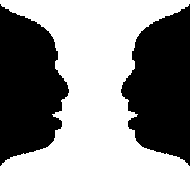
Equivocation
Taxonomy: Logical Fallacy >Informal Fallacy > Ambiguity > Equivocation
Subfallacy: Ambiguous Middle
Example:
The elements of the moral argument on the status of unborn life…strongly favor the conclusion that this unborn segment of humanity has a right not to be killed, at least. Without laying out all the evidence here, it is fair to conclude from medicine that the humanity of the life growing in a mother's womb is undeniable and, in itself, a powerful reason for treating the unborn with respect.1
Counter-Example:
The humanity of the patient's appendix is medically undeniable.
Therefore, the appendix has a right to life and should not be surgically removed.
Exposition:
Equivocation is a type of ambiguity in which a single word or phrase is ambiguous, which contrasts with amphiboly2, which is grammatical ambiguity. So, when a word or phrase equivocates, it is not due to grammar, but to the phrase as a whole having two distinct meanings. Take, for instance, the equivocal word "bank", which has two unrelated meanings:
- A riverside
- A type of financial institution
Consider the following, rather implausible, argument:
All banks are beside rivers.
Therefore, the financial institution where I deposit my money is beside a river.
If "bank" in this argument means "riverside", then the premiss is true but the argument is invalid, so it's unsound. If "bank" means "financial institution", then the argument is valid, but the premiss is false, thus the argument is again unsound. So, in either case, the argument is unsound. Similarly, any argument which commits the fallacy of Equivocation will be unsound.
Exposure:
Most words are ambiguous, but context usually makes the intended meaning clear. Moreover, equivocation alone is not fallacious, though it is a linguistic boobytrap which can trip people into committing a fallacy. The Fallacy of Equivocation occurs when an equivocal word or phrase makes an unsound argument appear sound.
Analysis of the Example:
This argument equivocates on the word "humanity"—"the condition of being human"—which means "of, … or characteristic of mankind"3. The two relevant meanings here are:
- "of…mankind", meaning being a member of the human species.
- "characteristic of mankind". For instance, the "human heart" is "human" in this sense, since it is not a human being, but is the kind of heart characteristic of human beings.
Applying this to Alvaré's argument, it is true that the "humanity" of an embryo or fetus is medically undeniable, in the second sense of "human"—that is, it is a "human embryo or fetus". It is, however, an equivocation on "human" to conclude, as Alvaré did, that it "has a right not to be killed". Parts of the human body are "human" in this sense, but it is only a whole human being who has a right to life.
Reader Response:
Steven Weiss writes:
In your first example of an equivocation fallacy, the counter example has a bit of faulty reasoning. An appendix is undoubtedly human but, having the same genes as the rest of the body, can be empirically proven to be a part of the host body. A fetus, however, has unique genetics that show (also empirically) that it is a separate life form, dependent though it is on its host. This seems to be a fallacy of accident in that you argue:Organs are living components in a body. Fetuses are living and in a body. Therefore, fetuses are equivalent to organs.
A counter-example to an argument is an argument with the same logical form, but obviously true premisses and a false conclusion. Because the counter-example argument has true premisses and a false conclusion, it must be invalid. Since the counter-example has the same logical form as the example argument, this shows that the example lacks a validating form. In the case of a counter-example to an example of an informal fallacy, the counter-example must also commit the same type of fallacy.
The specific Counter-Example above has only one premiss: "The humanity of the patient's appendix is medically undeniable." This is undeniably true, assuming that the patient is a human being, who will therefore have a human appendix. The conclusion of the Counter-Example is: "The appendix has a right to life and should not be surgically removed," which I presume is uncontroversially false.
I'm not claiming that a fetus is part of its mother's body, and the only sense in which I'm claiming that the fetus and an organ are "equivalent" is that the "humanity" of both is "undeniable." Since the argument in question is an example of the fallacy of equivocation, there are two senses of "humanity", one of which implies a right to life and another which doesn't. Clearly, the sense in which an appendix is human does not imply that it has a right to life.
In which sense is the "humanity" of the fetus "undeniable"? If the sense involved is that which does not imply a right to life, then the argument is invalid; if the sense is that which does imply a right to life, then the argument is valid. However, in that sense of "humanity", the "humanity" of the fetus is not undeniable, and many do deny it, so the premiss is false. As I tried to explain in the Exposition, above, this pattern is typical of fallacies of equivocation: on one interpretation of the equivocal word, the argument is invalid; on the other, a premiss containing the word is false. In either case, the argument is unsound.
Finally, I don't see how the fallacy of accident is relevant4.
Notes:
- Helen M. Alvaré, The Abortion Controversy (Greenhaven, 1995), p. 24.
- See the entry for the fallacy of amphiboly for more on this type of ambiguity.
- The Random House College Dictionary, (Revised Edition, 1975).
- The fallacy of accident is very obscure and has been interpreted in quite different ways; see the entry for that fallacy. I don't know what interpretation Steven had in mind.
Acknowledgment: Thanks to David McRobert for pointing out a typographical error.